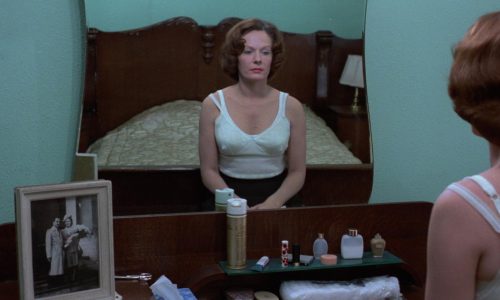The Belgian director Chantal Ackerman has become the first woman to top the BFI’s Sight & Sound list of the top 100 greatest films of all time.
Every ten years, the publication compiles the list by asking a growing number of critics, programmers, curators, archivists and academics for their top ten; this year, more than 1600 people were polled.

The first list, in 1952, was topped by Vittorio De Sica’s Bicycle Thieves, followed five times by Orson Welles’ Citizen Kane, with Alfred Hitchcock’s Vertigo at Number One in 2012. But this year, the number one film was the 1975 drama Jeanne Dielman, 23 quai du Commerce, 1080 Bruxelles. With a running time of nearly three and a half hours, it follows a widow who turns to prostitution and ends up killing one of her clients.
Writing in Sight & Sound, the film theorist Laura Mulvey says, “In a film that, agonisingly, depicts women’s oppression, Akerman transforms cinema, itself so often an instrument of women’s oppression, into a liberating force.”
The list has, in the past, been criticised for a lack of diversity, prompting the organisers to expand the cohort of voters. It’s a slow-moving list, with only four entries released since the 2012 edition; one from a woman and the other three from ethnic minority directors. Jordan Peele’s Get Out, from 2017, is at joint 95th on the list, Bong Joon-ho’s 2019 Best Picture Oscar winner Parasite at number 90 and another Best Picture winner, Barry Jenkins’ Moonlight at equal 60th. Celine Sciamma’s Portrait of a Lady on Fire is at number 30, with no other film from the past twenty years ahead of it.
The editor of Sight & Sound, Mike Williams, said “While it’s great to see previous winners Vertigo and Citizen Kane complete the top three, Jeanne Dielman’s success reminds us that there is a world of under-seen and under-appreciated gems out there to be discovered.”
The BFI’s Jason Wood said: “As well as being a compelling list, one of the most important elements is that it shakes a fist at the established order. Canons should be challenged and interrogated and as part of the BFI’s remit to not only revisit film history but to also reframe it, it’s so satisfying to see a list that feels quite radical in its sense of diversity and inclusion.”
Here are the top 20 films on the list:
1 Jeanne Dielman, 23, quai du Commerce, 1080 Bruxelles (Chantal Akerman, 1975)
2 Vertigo (Alfred Hitchcock, 1958)
3 Citizen Kane (Orson Welles, 1941)
4 Tokyo Story (Ozu Yasujiro, 1953)
5 In the Mood for Love (Wong Kar-wai, 2001)
6 2001: A Space Odyssey (Stanley Kubrick, 1968)
7 Beau travail (Claire Denis, 1998)
8 Mulholland Dr. (David Lynch, 2001)
9 Man with a Movie Camera (Dziga Vertov,1929)
10 Singin’ in the Rain (Stanley Donen & Gene Kelly, 1951)
11 Sunrise: A Song of Two Humans (F.W. Murnau, 1927)
12 The Godfather (Francis Ford Coppola, 1972)
13 La Règle du jeu (Jean Renoir, 1939)
14 Cléo from 5 to 7 (Agnès Varda, 1962)
15 The Searchers (John Ford, 1956)
16 Meshes of the Afternoon (Maya Deren & Alexander Hammid, 1943)
17 Close-Up (Abbas Kiarostami, 1989)
18 Persona (Ingmar Bergman, 1966)
19 Apocalypse Now (Francis Ford Coppola, 1979)
20 Seven Samurai (Akira Kurosawa, 1954)
